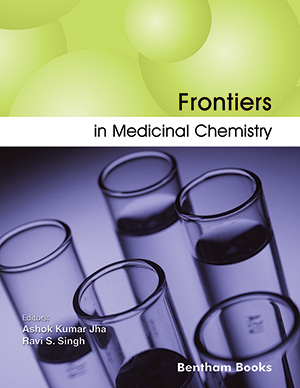Abstract
Background: In the last years, severe acute respiratory syndrome coronavirus 2 (SARS-CoV-2) caused more than 760 million infections and 6.9 million deaths. Currently, remains a public health problem with limited pharmacological treatments. Among the virus drug targets, the SARS-CoV-2 spike protein attracts the development of new anti-SARS-CoV-2 agents.
Objective: The aim of this work was to identify new compounds derived from natural products (BIOFACQUIM and Selleckchem databases) as potential inhibitors of the spike receptor binding domain (RBD)-ACE2 binding complex.
Methods: Molecular docking, molecular dynamics simulations, and ADME-Tox analysis were performed to screen and select the potential inhibitors. ELISA-based enzyme assay was done to confirm our predictive model.
Results: Twenty compounds were identified as potential binders of RBD of the spike protein. In vitro assay showed compound B-8 caused 48% inhibition at 50 μM, and their binding pattern exhibited interactions via hydrogen bonds with the key amino acid residues present on the RBD.
Conclusion: Compound B-8 can be used as a scaffold to develop new and more efficient antiviral drugs.
Keywords: COVID-19, SARS-CoV-2, Spike protein, Ursolic acid, ACE2, virtual screening.
Medicinal Chemistry
Title:Structure-based Virtual Screening from Natural Products as Inhibitors of SARS-CoV-2 Spike Protein and ACE2 Receptor Binding and their Biological Evaluation In vitro
Volume: 20 Issue: 5
Author(s): Timoteo Delgado-Maldonado, Luis Donaldo Gonzalez-Morales, Alfredo Juarez-Saldivar, Edgar E. Lara-Ramírez, Guadalupe Rojas-Verde, Adriana Moreno-Rodriguez, Debasish Bandyopadhyay and Gildardo Rivera*
Affiliation:
- Laboratorio de Biotecnología Farmacéutica, Centro de Biotecnología Genómica, Instituto Politécnico Nacional, 88710 Reynosa, México
Keywords: COVID-19, SARS-CoV-2, Spike protein, Ursolic acid, ACE2, virtual screening.
Abstract:
Background: In the last years, severe acute respiratory syndrome coronavirus 2 (SARS-CoV-2) caused more than 760 million infections and 6.9 million deaths. Currently, remains a public health problem with limited pharmacological treatments. Among the virus drug targets, the SARS-CoV-2 spike protein attracts the development of new anti-SARS-CoV-2 agents.
Objective: The aim of this work was to identify new compounds derived from natural products (BIOFACQUIM and Selleckchem databases) as potential inhibitors of the spike receptor binding domain (RBD)-ACE2 binding complex.
Methods: Molecular docking, molecular dynamics simulations, and ADME-Tox analysis were performed to screen and select the potential inhibitors. ELISA-based enzyme assay was done to confirm our predictive model.
Results: Twenty compounds were identified as potential binders of RBD of the spike protein. In vitro assay showed compound B-8 caused 48% inhibition at 50 μM, and their binding pattern exhibited interactions via hydrogen bonds with the key amino acid residues present on the RBD.
Conclusion: Compound B-8 can be used as a scaffold to develop new and more efficient antiviral drugs.
Export Options
About this article
Cite this article as:
Delgado-Maldonado Timoteo, Gonzalez-Morales Luis Donaldo, Juarez-Saldivar Alfredo, Lara-Ramírez Edgar E., Rojas-Verde Guadalupe, Moreno-Rodriguez Adriana, Bandyopadhyay Debasish and Rivera Gildardo*, Structure-based Virtual Screening from Natural Products as Inhibitors of SARS-CoV-2 Spike Protein and ACE2 Receptor Binding and their Biological Evaluation In vitro, Medicinal Chemistry 2024; 20 (5) . https://dx.doi.org/10.2174/0115734064279323231206091314
| DOI https://dx.doi.org/10.2174/0115734064279323231206091314 |
Print ISSN 1573-4064 |
| Publisher Name Bentham Science Publisher |
Online ISSN 1875-6638 |
Call for Papers in Thematic Issues
Carbohydrates in Computational and Medicinal Chemistry
Carbohydrates are the most essential organic molecules and are involved in the maintenance of various physiological and metabolic processes in living organisms. Carbohydrate-based compounds have come to the attention of researchers because of their significant contributions to biological functions, such as cell development and cell proliferation, connections between several cells, ...read more
Recent Advances in the Medicinal Chemistry of Cancer
Scope of the Thematic Issue: Correlation between structure and function is one of the important aspects of the success of anti-cancer compounds associated with their structure-activity interactions, physiology, biochemical, molecular, and genetic processes. Overcoming these obstacles is key to obtaining further insights into developments in rational drug design, bioorganic chemistry, ...read more
 5
5
- Author Guidelines
- Graphical Abstracts
- Fabricating and Stating False Information
- Research Misconduct
- Post Publication Discussions and Corrections
- Publishing Ethics and Rectitude
- Increase Visibility of Your Article
- Archiving Policies
- Peer Review Workflow
- Order Your Article Before Print
- Promote Your Article
- Manuscript Transfer Facility
- Editorial Policies
- Allegations from Whistleblowers


























